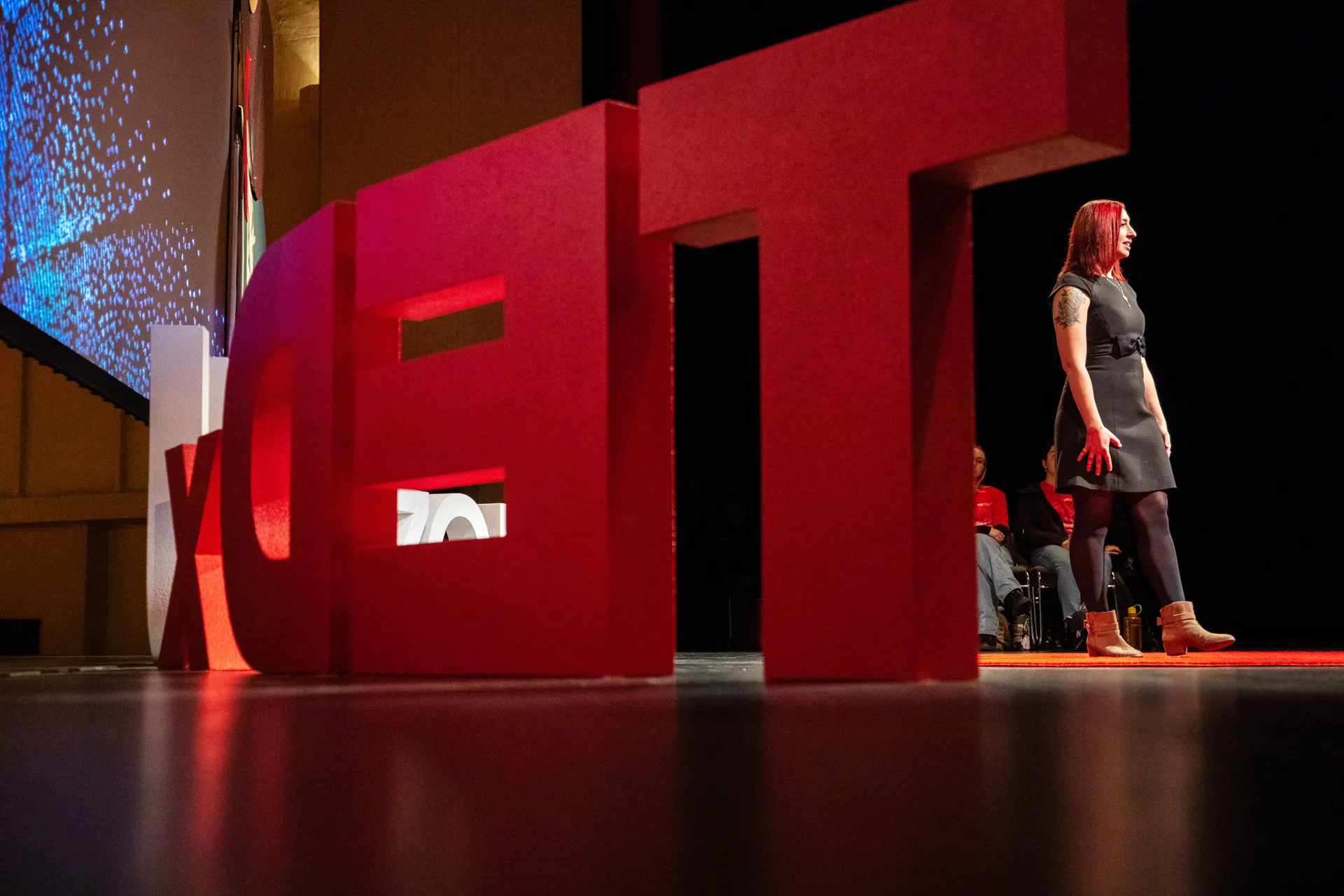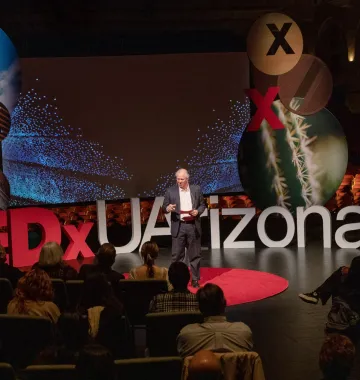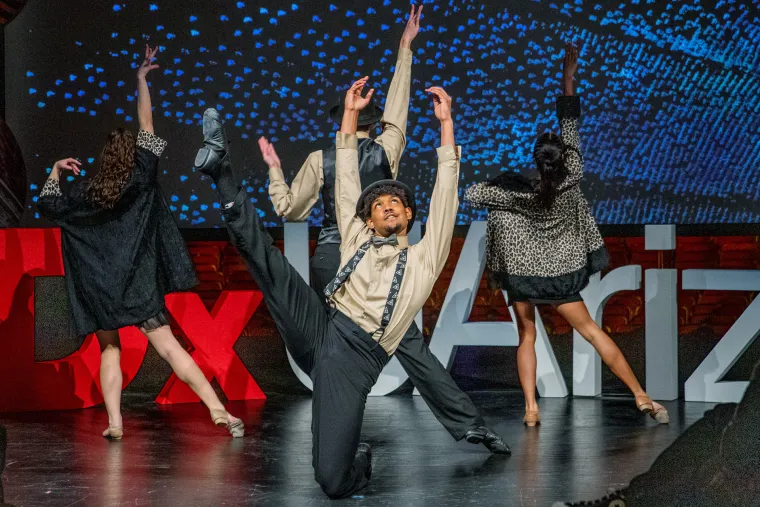The Messy Middle
Speakers explored ‘the in-between’ during the inaugural TEDxUArizona event at Centennial Hall.

Jennifer Carlson, a 2022 MacArthur Fellow,explored the theme of “The Messy Middle.”
Chris Richards
Today, the University of Arizona’s Centennial Hall — a prominent Tucson arts venue constructed in the ’30s and renovated half a century later — has 2,454 seats upholstered in Wildcat red. None were in use, however, for January’s inaugural TEDxUArizona event — though not for lack of a ready audience.
Eighty-five students, faculty and staff were awarded tickets by lottery. They, alongside the 15 speaker guests, sat in black folding chairs on the low-lit hall stage, close to the day’s six presenters and two performances. TEDx signage blocked views of the auditorium, creating the illusion of a smaller space.
The proceedings nonetheless felt big — big enough to wonder, as UArizona President Robert C. Robbins did in his opening remarks, whether future TEDxUArizona crowds might fill most of those 2,000 empty seats.
TEDx is an independent, international speaker series modeled on TED Talks, which celebrate “ideas worth spreading.” UArizona has previously held TEDx events, but January’s marked the beginning of a new biannual campus series.
The inaugural event’s faculty and student speakers — including Jennifer Carlson, a 2022 MacArthur Fellow — explored the theme of “The Messy Middle,” considering how ambiguity, uncertainty and middle zones define our experiences as human beings. In keeping with the TEDx format, each speaker took the stage for 18 minutes or less.
In her talk on the grieving brain, Mary-Frances O’Connor ’00 ’04 characterized grief as a learning process forcing the brain to resolve conflicting “streams,” or realities.

President Robbins at the TEDxUArizona event
Chris Richards
In one reality, the UArizona associate professor of psychology explained, the person who died is gone. But in the other, they are “everlasting.” In time, she said, the brain processes the loss, permitting the grieving person to form new relationships and “restore a meaningful life.”
Hona Vaioleti, a high school speech-and-debate state champion now studying engineering and Spanish as a first-year Wildcat, spoke to the muddled middle ground in the context of immigration and identity.
As the American-born son of Tongan immigrants, Vaioleti said he felt neither American nor Tongan during his youth. He couldn’t understand the Tongan language at the funeral of a relative, though he nodded along as if he did. American classmates, meanwhile, believed his family came from Hawaii, and he rarely corrected them.
After learning Tongan in high school, however, Vaioleti said that he came to understand and embrace “the power of living in the in-between” — the place, he says, “where I was born.”
Carlson, for her part, addressed partisanship in the gun debate, which she said stifles empathy and understanding. While society often pits staunch gun rights advocates against hardline supporters of gun control, she said that the gun debate is in fact much more nuanced. Most Americans, Carlson noted, do not favor a universal ban on handguns, and most Americans do favor universal background checks. Gun rights versus gun control, she concluded, might not be an “either/or” but instead a “both/and” proposition.
“Breaking up with partisanship, refusing to let our political differences divide us, allows us to see each other as the complicated, contradictory and messy people that we are or could become,” Carlson said.
Carlson, an associate professor at UArizona who teaches in both the School of Sociology and the School of Government and Public Policy, received the MacArthur Fellowship — the so-called “genius grant” — in October 2022. The $800,000 grant is awarded to 25 American scholars, scientists and artists each year, with no accompanying responsibilities or requirements.
“The no-strings-attached nature of this fellowship is overwhelming. I see it as a wide-open invitation as well as an immense responsibility,” Carlson said when she received the award. “I have a lot of thinking to do about plans for the fellowship, but I do know that this fellowship reflects not just my efforts but also the incredible support of all kinds from my mentors and my family.”
Carlson’s books include “Citizen-Protectors: The Everyday Politics of Guns in an Age of Decline,” published in 2015, and “Policing the Second Amendment: Guns, Law Enforcement, and the Politics of Race,” published in 2020. Her third title, “Merchants of the Right: Gun Sellers and the Crisis of American Democracy,” comes out this year through Princeton University Press.
She continues to seek honest and open dialogue on an increasingly fraught issue in the United States, in part by affirming that guns mean different things to different people and communities.
“Yes, I have met that quintessential American gun owner, the white conservative guy who owns a few guns,” Carlson said during her TEDx talk. “But I’ve also met enough people who break that mold or push back or play along its edges to know that we’ve got to think beyond it if we are going to have a better gun debate.”
Among the other speakers, Mónica Ramírez-Andreotta ’02 ’12, an associate professor of environmental sciences, called for wider community participation in scientific research, which she says is too often carried out by walled-off academics. Kai Lepley, a doctoral candidate in the School of Geography, Development and Environment who studies the practice of growing crops beneath solar panels, gave a talk titled “How to Survive a Hotter, Dryer Future: Think Like a Desert.” And undergraduate Patrick Robles, president of the Associated Students of the University of Arizona, considered Generation Z’s tumultuous coming of age — both the horrific moments, including school shootings, and the inspiring, such as the 2008 election of President Barack Obama.

School of Dance students Riley Jo Parish, Kennedy Frazier, Kyle Anders and Diego Gonzales perform to the music of big band legend Count Basie onstage at Centennial Hall.
Chris Richards
The campus a cappella group Meow or Never also took the stage, capping a series of songs with a playful rendition of “Bear Down, Arizona.” Four students from the School of Dance — Riley Jo Parish, Kennedy Frazier, Kyle Anders and Diego Gonzales — closed the day with propulsive choreography set to the music of jazz big-band legend Count Basie.
Diana Leonard ’82 ’10, a senior lecturer and director of public speaking in the department of communication, coached the presenters leading up to the event. Misha Harrison and Joe Klug from the UArizona experience team planned the day, which also included remarks from Provost Liesl Folks and John Denker, UArizona interim senior vice president of marketing and communications. Harrison emceed between speakers.
“The middle,” Harrison said early on, “is where creativity happens.”
TEDxUArizona will return in the fall semester. In the meantime, you can find video from the inaugural event on the TEDx YouTube channel.
